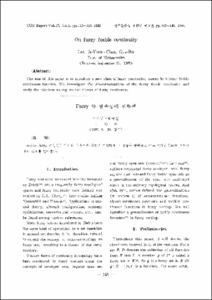기업의 소유 구조와 의결권의 가치
- Alternative Title
- Ownership Structure and the Value of the Vote in the Korean stock Market
- Abstract
- 본 연구는 구형우선주를 발행한 한국상장기업을 대상으로 의결권의 ?∞×? 영향을 미치는 요소들이 무엇인지를 Zingales의 모형을 이용하여 분석하였다. 그 결과 가설에서 설정한 것처럼 보통주와 우선주의 가격차이비율은 경영권을 획득하여 기업을 지배할 경우 얻을 있는 Private Benefits의 기대값의 크기에 의존함을 발견하였다. 표본기간인 1996년부터 1999년 4년간의 자료를 포함시킬 때, 지배대주주가 얻을 수 있는 Private Benefits의 크기가 기업 전체 Cashflow 중 20-30%이었다. 기대 Private Benefits은 경영권을 획득하였을 때 얻을 수 있는 Private Benefits과 소액주주가 보유한 지분이 경영권의 향배를 결정 짓는 확율의 개념을 의미하는 Shapley Value를 변형시킨 Relative Shapley Value를 총주식중 의결권 있는 주식의 비중으로 나눈 값의 곱으로 나타난다. 이외 의결권의 가치에 영향을 미치리라 예상되는 여러 통제변수를 분석에 포함시킨 결과, 우선주식의 유동성과 재벌 그룹의 소속여부는 의결권의 가치에 음의 영향을 미쳤으며, 배당수익률의 차이와 기업규모는 양의 영향을 미치는 것으로 나타났다.
Ownership Structure and the Value of the Vote in the Korea stock Market
This paper studies the determinants of the value of voting rights for Korean Listed firms which issued old fashioned preferred stock for the period from 1996 to 1999, by using Zingales model. Results support the hypothesis that the value of a vote is determined by the expected private benefits shareholders will receive for their vote in case of assuming the control of a firm. For the whole sample period, up to 20 - 30% of the variation of the voting premium are explained by this factor. The expected private benefit is the function of private benefit obtainable by controlling the company and the probability that the fraction of stock owned by small shareholders is pivotal in a control contest. While the relative liquidity of preferred stock over common stock and a dummy varible whether a firm is chaebol related shows negative effects, the difference of dividend yields and the size of the firm have positive effects to the voting premiums.
Ownership Structure and the Value of the Vote in the Korea stock Market
This paper studies the determinants of the value of voting rights for Korean Listed firms which issued old fashioned preferred stock for the period from 1996 to 1999, by using Zingales model. Results support the hypothesis that the value of a vote is determined by the expected private benefits shareholders will receive for their vote in case of assuming the control of a firm. For the whole sample period, up to 20 - 30% of the variation of the voting premium are explained by this factor. The expected private benefit is the function of private benefit obtainable by controlling the company and the probability that the fraction of stock owned by small shareholders is pivotal in a control contest. While the relative liquidity of preferred stock over common stock and a dummy varible whether a firm is chaebol related shows negative effects, the difference of dividend yields and the size of the firm have positive effects to the voting premiums.
- Issued Date
- 2000
- Type
- Research Laboratory
- Alternative Author(s)
- Kim, Kee-Ho
- Publisher
- 경영학연구논문집
- Language
- kor
- Rights
- 울산대학교 저작물은 저작권에 의해 보호받습니다.
- Citation Volume
- 7
- Citation Number
- 2
- Citation Start Page
- 25
- Citation End Page
- 43
- Appears in Collections:
- Research Laboratory > Journal of management
- 파일 목록
-
-
Download
 000002025469.pdf
기타 데이터 / 176.52 kB / Adobe PDF
000002025469.pdf
기타 데이터 / 176.52 kB / Adobe PDF
-
Items in Repository are protected by copyright, with all rights reserved, unless otherwise indicated.